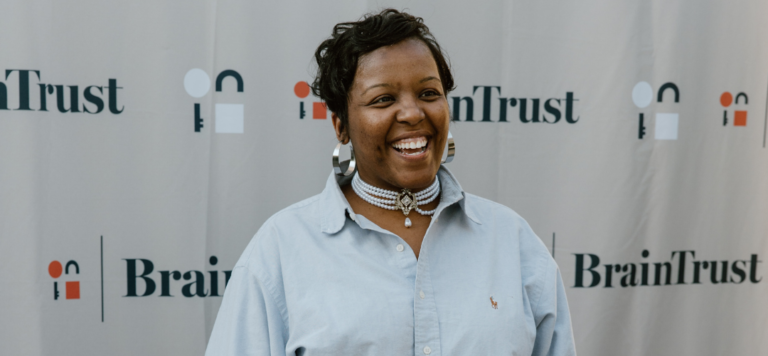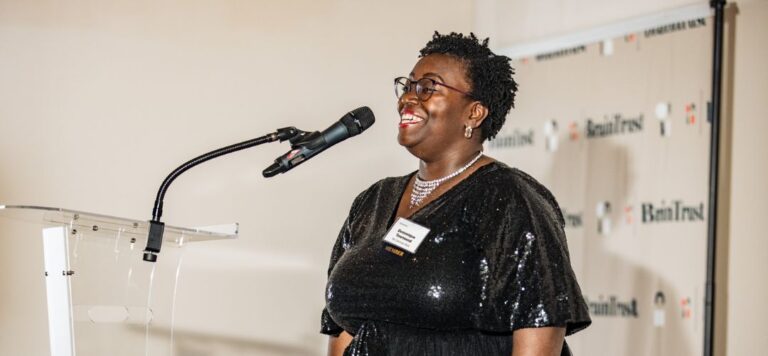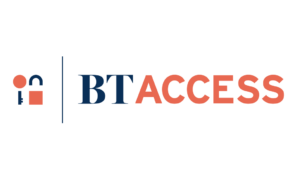Lonely at the Top?
WRITTEN BY SHERRY DEUTSCHMANN
For most of my life, when I heard the phrase “lonely at the top,” I thought of it as a sarcastic remark by someone AT the top, condescending to those they led, pointing out the fact that it was the few, the elite, that made it to the “top” – whatever that was.
Later, as I became an entrepreneur and a CEO, that phrase came to mean something quite different and it began to resonate. I began to see it as a humbler admission, that often, when you’re in the lead, you must fearlessly lead on, even though you are experiencing self-doubt, imposter syndrome, fear, and great anxiety. Here are just a few situations where that feeling of loneliness in my position changed my perception:
- In the early days, when I had a 50/50 founding partner who chose to walk out – leaving me “holding the bag.” I didn’t have her to talk with, to celebrate adding new clients, or to worry with me about how to grow and scale when our resources were so limited.
- There was little time for social life. I was working 70 hours a week, and then on the rare occasion when I could make time for friends, it was weird. They just couldn’t understand why I’d given up a good-paying job to work out of my basement.
- As the company grew and I took on an investor and appointed a board of directors, I recall feeling so alone, terrified even… walking into a board meeting to explain the latest setback. (Imagine me in that room with my high school education, sitting across the table from my investor, a man who’d taken 42 companies public, …trying to convince him and the others that I was the right person to lead the company!).
I could go on for hours, telling you about crucial times when I needed someone to talk with, but no one was there. But that all changed when I joined a peer-to-peer membership for business owners and found my “tribe”. They understood my predicament because they’d experienced similar situations with their own companies. What a relief! To be able to talk with someone who’d been where I’d been, who’d either screwed it up badly or had succeeded beautifully. Both sets of experiences would be so valuable to me!
At the core of most peer-learning organizations is a monthly meeting during which each person reports on the most impactful things (business or personal) going on in their lives, and then shares important challenges they are facing. Next, the fellow members ask clarifying questions regarding the challenge described, ensuring they are getting to the heart of the matter, not just the superficial symptoms of the issue. Finally, instead of giving their advice on such a matter, they share their own experiences in dealing with a similar or related problem, allowing you to see the potential outcomes of your actions or inactions. Incredibly valuable.
I found it so valuable that I was a member of two groups, taking a lot of my time. And I was on several boards. Simultaneously, my fast-track company was experiencing serious growing pains. Physically and mentally exhausted, I took a drastic measure and withdrew from everything. I canceled my memberships and withdrew from the boards on which I served, and just said “Sorry, I must focus on my own business and personal health this time.” I decided that I’d add back only those things that really made a difference. All was well until it wasn’t.
It was a Monday morning. I was reviewing multiple offers to buy my company when I found that one of my most trusted, most beloved team members had done something that felt like a deep betrayal. And something that could negatively impact the impending sale. I was devastated. I didn’t know where to turn or what to do.
Have you ever driven somewhere when you were upset and then later realized you didn’t remember the drive? That was me that Monday morning. I found myself at a 500-person luncheon listening to some expert on something, sitting between two friends – one was my banker and the other was a member of EO – the group I’d belonged to. I was so distracted that I didn’t hear a word the speaker was saying. So, I whispered goodbye to the friend on my left. And then to my friend on the right, I whispered “Hey Darek, I have a crisis at work, and I have no business being here right now. I need to go back to the office to try to figure this out.”
Darek whispered back “Why don’t you call your forum (EO group) and get their help?” Yikes! He didn’t know I’d dropped out. I quietly told him I was no longer a member and therefore didn’t have a forum to call. His reaction: “Hold on…I’ll see if my group can meet with you” as he started texting them. 30 minutes later, the members of his group had dropped what they were doing and were sitting around a table in my home, eager to help me determine the right path forward. As is the standard protocol, I laid out the problem as best I could and they went ‘round the circle a few times, asking questions to gain clarity. Then, they shared their relevant experiences and VOILA, the decision became clear.
With the wisdom that came from their own lived experiences, I was able to solve one of the biggest challenges I’d ever faced as a leader. I knew I never wanted to be without my tribe again, so I immediately rejoined.
Here are some reasons why having this group is invaluable to me (and will be to you):
- When you’re at the top of the org chart, who is going to tell you the hard truth and call you out when needed? Even in small companies, politics are always at play and it’s hard to get people to tell you what you don’t want to hear. Or to tell you when your ego is out of control or you are being willfully blind.
- If you’re in a partnership and you have a problem with your partner, who are you going to talk with about it? If you want to buy them out…who are you going to talk with about that?
- If you’re facing the possibility of bankruptcy, who are you going to talk with about it?
- If you need to add several new people in key positions and don’t know what the pay scale and incentive package should be, who do you turn to?
- And importantly, if you have ambitious goals for your company, who is going to hold you
accountable to meeting those goals?
See what I mean? Often, when you’re at the top, you have no one with whom to hash out all these things. “It’s lonely at the top.” You need company….people who understand and can help you choose the course and hold you accountable for staying on course. You need a tribe.
When I sold my first company in 2016 and began a new chapter in my life, I was approached by dozens of women of all ages, all seeking advice in growing their companies. They were lonely. It was obvious they needed their own groups. I started a new company, BrainTrust, a peer-to-peer membership just for women business owners.
It is such a joy to see our members, my peers, pushing one another. Hold each other accountable. Openly sharing their mistakes…and their expertise. Celebrating their successes together. They are no longer alone.








